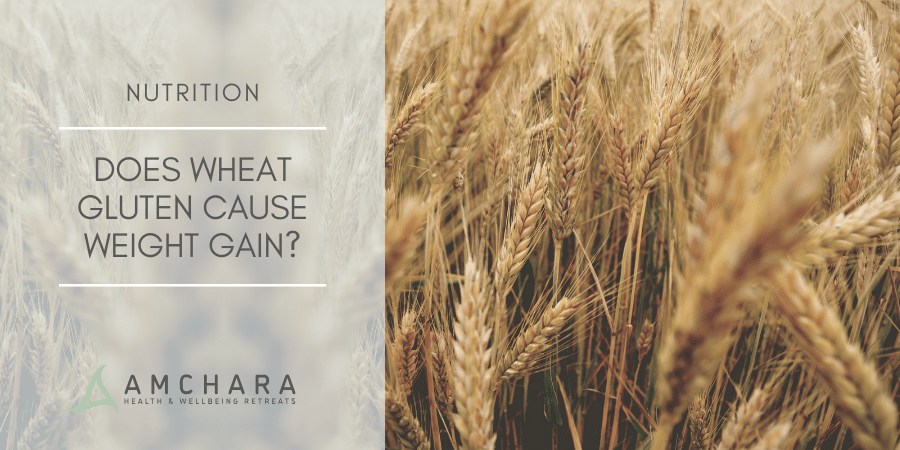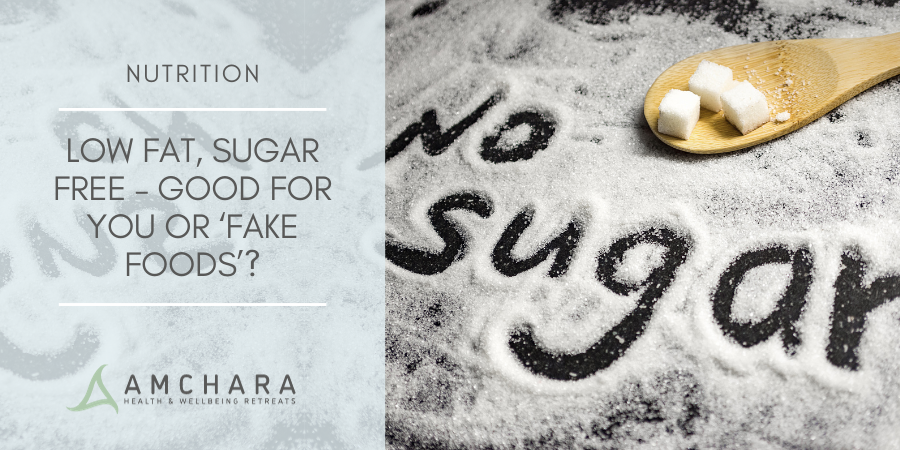Over the years, it has become trendy to ditch products which contain gluten as a tactic in order to lose weight.
Many celebrities have adopted a gluten-free diet (which also has been referred to as a “fad” diet) and therefore it has gained widespread coverage and debate within the media.
For myself and many other guests that attend Amchara, decreasing and completely eliminating products containing gluten has assisted in alleviating digestive issues such as IBS and stomach bloating, as well as accelerate weight loss.
Does wheat gluten attribute to weight gain?
Whilst there are a range of factors involved in weight loss, does eating a diet rich in wheat gluten attribute to weight gain?
Previous research has shown that the link between wheat gluten and body weight is unclear, however, interestingly a new study* [1] has investigated this further.
Mice were fed four different types of diets over eight weeks.
A standard control diet, a standard control diet with 4.5% of wheat gluten (concentrated gluten) added and high-fat diet and a high-fat diet with 4.5% wheat gluten (concentrated gluten) added – ensuring all energy expenditure was equal.
“Previously, we showed that a gluten-free diet reduces weight gain without changing food intake in mice fed high-fat diets.
In the present study, we investigated the effects of gluten intake on fat metabolism, thermogenesis and energy expenditure in mice fed a standard or high-fat diet.”
The research found that mice on the control diet with wheat gluten added and the high-fat diet with wheat gluten added, both showed evidence of increased weight gain and fat deposits in comparison to those mice on the standard control diet.
The study concluded that “wheat gluten promotes weight gain in animals on both HFD (high-fat diet) and CD (control diet), partly by reducing the thermogenic capacity of adipose tissues.”
Should you throw out all products that contain wheat gluten?
Whilst the evidence shows that weight gain is possible with wheat gluten included in a diet, it’s also important to see how you feel after eating these products.
However, replacing wheat gluten with gluten free products can also pose other issues – as generally, the ingredients include other grains, sugar as well as artificial ingredients and preservatives.
Therefore, sticking to real foods as much as possible and only allowing processed and wheat gluten-containing products in your diet on an occasional basis (rather than treating it as a staple food) is the best option.
* Reference: Wheat gluten intake increases weight gain and adiposity associated with reduced thermogenesis and energy expenditure in an animal model of obesity.
What are wheat and gluten?
Often the two are used interchangeably but they are quite different; wheat is a type of grain that contains gluten, gluten is a protein that can be found in wheat and also other grains too, such as barley, spelt, rye and oats.
Both wheat and gluten can be found in many foods and products including bread, pasta, cakes, biscuits and surprisingly in soups, sauces and condiments too.
Why has wheat become such a problem?
In recent years, wheat seems to have become such a problematic dietary substance and there are some quite likely reasons for that:
- Our lack of evolutionary adaption to grasses and grains
- The genetic modification and hybridisation of wheat resulting in higher gluten content of everyday foods
- The general increase of grains and grain-based foods in our diets today
7 Reasons to choose a diet free-from wheat
- Wheat contains a starch called amylopectin A, which has a very high GI and is quickly converted to sugar in the blood. This causes a spike in blood sugar levels and insulin which are both linked to the development of diabetes and obesity.
- Wheat is a common food allergen which can cause digestive, weight and immune-related problems mainly through the aggravation of the gut lining.
- Expert in the field of wheat, Dr William Davis, author of ‘Wheat Belly’ has findings that suggest gluten to be an appetite stimulant which could lead to unnecessary weight gain.
- Wheat contains a protein called WGA that is not tolerated well by the majority of the population that can lead to gut inflammation and digestive complaints.
- Consumption of wheat frequently in healthy individuals has been shown to pre-curse a condition called leaky gut, which causes a breakdown of the gut wall lining.
- Wheat contains phytic acid, a substance that we can tolerate in small amounts, but when frequently ingested in large amounts can lead to poor absorption of minerals such as zinc and iron.
- Wheat is addictive due to the gluten-derived polypeptides which can cross the blood-brain barrier and bind opiate receptor sites. This causes a mildly euphoric state after eating a product made with wheat.
What about gluten?
Coeliac disease is an auto-immune disease characterised by an allergy to gluten.
The protein is very harmful to the lining of the gut and due to an immune reaction, it creates inflammation, damage and decay to the cells.
A suspected gluten allergy needs to be tested for, but more commonly in recent years is a sensitivity and intolerance for gluten which is contributing to many health issues including leaky gut and IBS.
How do I know if it is affecting me?
The only way to really tell if wheat, or gluten or any other food substance for that matter is causing your health issues, is to eliminate it from your diet.
The gold standard for eliminating the suspect food is to remove it from your diet for 2-4 weeks and note any changes, both positive and negative.
If your wellbeing and health improve, then reducing or cutting out gluten may be a good choice.
What you might notice if you choose to go gluten-free
- Improved digestion and digestive function which in turn helps with weight loss
- Reduced excess fluid and water retention
- Improved bowel function and elimination
- Improved mental clarity and better mood
Related topics of interest:




